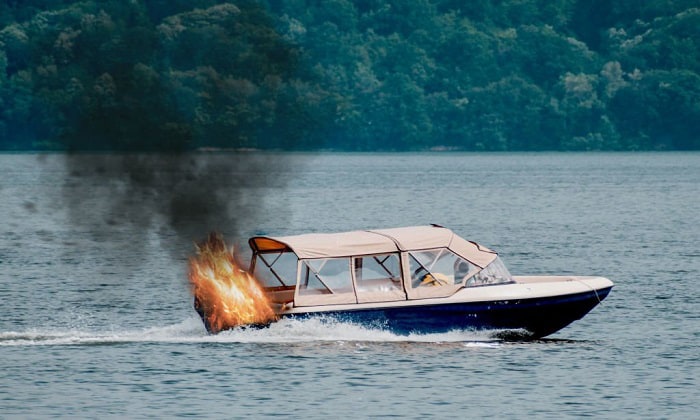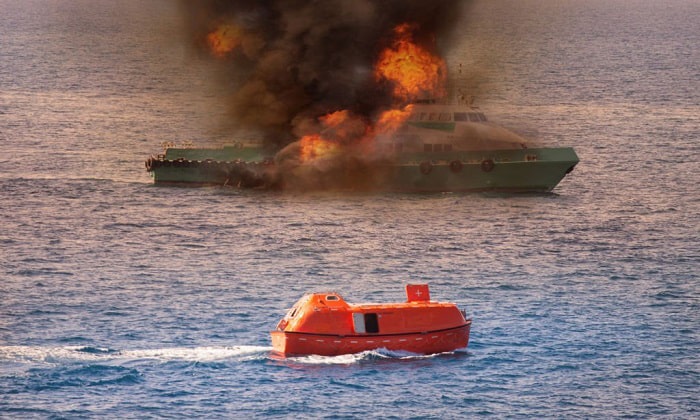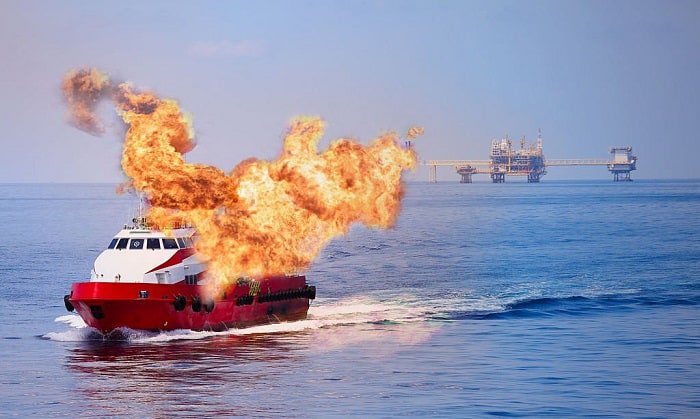A fire breaking out can be an extremely frightening experience, as someone who has gone through the experience will tell you. Just imagine if it happens while you’re out sailing and there’s nowhere to escape to. What should you do if a fire breaks out in the back of your boat?
In this article, we’ll talk about what to do if a fire starts on board. We’ll also cover preventive measures that can help keep us away from such situations while on a boat.
Keep reading to learn more.
Table of Contents
What to Do in Case of Fire in the Back of a Boat
If a fire breaks out on the boat, the first thing you need to do is to try to keep yourself calm. In any situation involving fire, act swiftly to keep everyone out of harm’s way.
For this discussion, we are looking specifically at a fire in the back of the boat. For this type of situation, there exists an even higher risk for any boat with a motor especially those with gasoline on board.
Ideally, the steps included here should be taken at the same time as trying to put out the fire, so delegate which tasks you can.
Step 1: Position the boat with the fire downwind
The wind is an aggravating factor for any fire. Fires that occur on windy days usually result in it spreading more quickly, which applies to fire on a boat.
We must not leave the boat in a position where the fire will be allowed to spread quickly. With the fire in the back of the boat, we should position the boat with the bow facing the wind.
This will not keep the boat from burning, but it should give you more time to work on what needs to deal with the situation. This will also help keep smoke from building up on the boat.
Step 2: Turn off the engine
After positioning the boat, the next step should be turning off the engine and cutting off the power supply.
Since the fire is located in the back, there is a high probability that the engine will catch fire if it hasn’t already. It is important to try to take away as much as we can from the fire; this includes gasoline or anything that may feed the flames.
It’s also a good idea to cut off any electrical power to non-essential devices on the boat since faulty wiring is a possible cause of the fire.
Step 3: Account for everyone on board and inform them of the situation
Informing everyone on board the fire is another thing that needs to be done right away. It would be best if you can have someone else do this while tending to the boat’s position.
Have everyone wear their life jackets and be prepared to evacuate the boat should they need to. Ensure that everyone is accounted for so that no one is left behind. It’s also a good idea to check everyone for injuries and keep everyone away from smoke.
If you have a lifeboat on board, make sure that it is also ready to be deployed. It’s normal for everyone to be scared, but it’s important that you’re all aware of what’s happening and that you all keep your heads about you.
If the situation has become difficult to contain, evacuate right away.
Step 4: Call for help using the radio and other means
For dangerous emergencies such as fires, having nowhere to go and no one to help makes the situation dire. In this sort of life-threatening occurrence, ask for help right away. There is no time to hesitate.
When radioing for help, have relevant information ready such as your boat’s name, its location, and the number of passengers aboard. Try to speak slowly to convey the information properly.
Make use of other distress signals as well, though take note that smoke from the fire may already serve as a sort of visual distress signal but only when it’s still bright outside. Use other visual signaling devices such as flares if it is dark.
Remember not to underestimate such emergencies, or the consequences can be fatal.
Putting Out the Fire
Dealing with the fire yourself may be dangerous, so don’t attempt it unless you know what you’re doing.
The US Coast Guard requires different types of fire extinguishers on board, and knowing what each type is for is the minimum requirement for trying to put out the fire. If you’re not sure of what you’re doing, don’t try it at all since it may lead to an even worse situation.
Additionally, if the fire has grown or you could not put it out within two minutes, consider the situation too difficult to resolve by yourself. Remember that you should not try to put out the fire with water. Doing so may cause the fire to grow bigger and faster depending on what caused it.
Aftermath
If you could put out the fire, have the proper follow-up. Do not assume that the fire has been put out completely. Keep an eye out for any sign of the fire starting up again.
The next point is to go back to shore. Head back right away or wait for help to arrive if you called for it. Have the boat checked thoroughly.
Fire Prevention on a Boat
You should keep in mind that preventing fires from happening in the first place is still best. To keep ourselves out of harm’s way, we should take the time to cover several simple but effective fire prevention measures and precautions. Below are some of the most effective ones.
- Have USCG-approved fire extinguishers on board and know how to use them
- Make proper use of bilge blowers
- Avoid igniting a fire aboard
- Take proper refueling measures
- Inspect the engine and fuel connections regularly
- Check the boat’s electrical wirings periodically
- Ensure at least two exit points for the boat
Conclusion
What should you do if a fire breaks out in the back of your boat? Knowing it will allow you to act quickly and mitigate the damage that any fire may incur. However, this is just one possible scenario, and it’s important to prepare as much as we can for any danger when out on the water.
If you know anyone else wondering about dealing with such boating emergencies, please share what you know with them as well. Let’s help keep each other safe.
Remember to boat safely.

“My intention from the first day establishing Boating Basics Online is to provide as much help as possible for boaters who want to experience a first safe and convenient trip. So feel free to join us and share your beautiful journeys to the sea!”



